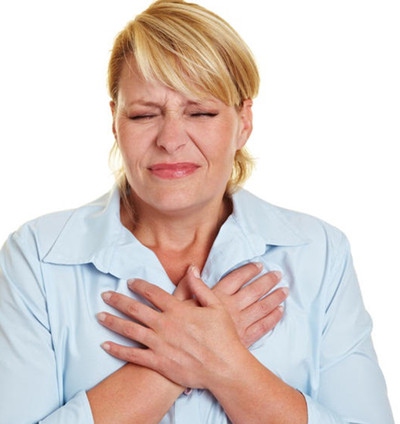"My heart hurts when I take a deep breath!" – if this describes you, then you need to see your doctor immediately. While in many cases the pain in your heart could actually be chest pain, it is important to rule out serious conditions such as heart problems that can be life threatening.
Chest pain can be caused by a variety of reasons including pain in any one of the organs located in the chest cavity – lungs, heart, esophagus, ribs, muscles, nerves or tendons. The pain could also have spread to the chest from the abdomen, back or neck. Depending on what is causing it, chest pain can be a stabbing, sharp, burning, dull, aching, tight or squeezing sensation. It is advisable to have a doctor examine you to determine the cause. However, here are some common causes of chest pain.

Why Does My Heart Hurt When I Take a Deep Breath?
Muscle Strain
Intense coughing can easily inflame or injure the tendons and muscles between the ribs. This will cause chest pain. This kind of pain tends to worsen with time.
Rib and Chest Injury
If you have a rib fracture, you will experience a sharp chest pain, which worsens when you cough or take deep breaths. The pain is more often than not confined to a single area that may feel sore when pressed. With such an injury, the joint between the rib cage and the breastbone may become inflamed. This condition is called Costochondritis and it causes chest pain when you take deep breaths. Injury to the ribs will heal on their own, but you can take pain killers and anti-inflammatory drugs.
Pneumonia
If the chest pain is on one side, it could be a sign of pneumonia. When you have pneumonia you will feel pain on either the right or left side of your chest. You will also discharge yellow or green sputum that may contain blood at times. The chest pain normally gets worse and is accompanied by coughing and shortness of breath. Pneumonia will require prescription medicine.
Pneumothorax
This is a condition that occurs as a result of the rupture of the wall linings of the lungs. This causes the lungs to collapse and as a result you can experience sharp chest pain, rapid breaths, rapid pulse and excessive perspiration. In case of pneumothorax, you should see a doctor as it can be fatal.
Pleurisy
The chest pain could be as a result of swollen wall linings in the lungs. This is a condition known as pleurisy. It is normally caused by pneumonia, a viral infection, lung cancer or tuberculosis. See a doctor as it can be fatal.
Pulmonary Embolism
This is a condition caused by the blockage of arteries by a clot in the lungs. You will experience fever, rapid breaths, chest pain and excessive perspiration. The color of your skin might also change to a pale blue hue. In extreme cases, you might cough up blood. See a doctor if you suspect you develop pulmonary embolism as it can be fatal.
Heartburn or Gastroesophageal Reflux Disease (GERD)
GERD or simply heartburn (acid reflux) can also lead to chest pain. GERD causes acids in the stomach to move upwards through the esophagus causing chest pain. The esophagus is located behind the middle of the chest hence it gives the impression that the pain is coming from the chest. You will feel a stinging burning sensation. If you’re suffering from GERD, you can treat it by following a special diet of fruits and vegetables. You should steer clear of fatty foods.
Heart Disease
Angina or heart disease could also be the cause of the chest pain. The pain is usually concentrated in the middle of the chest. This occurs when the heart does not get enough oxygen. The pain might feel like some sort of tightness, squeezing, heavy pressure or crushing pain. The pain can spread to the shoulder, arm, jaw or back. This condition requires surgery or angioplasty.
Other Causes
Sometimes if you have the feeling of "heart hurts when I take a deep breath", the causes may also include:
Stress or panic attack accompanied by fast breathing. Taking part in relaxing activities such as yoga and meditation will help.
Shingles, whereby you experience sharp, tingling pain on one side of the chest and back. You may also develop a rash.
Narrowing or spasms of the esophagus.
Gallstones which cause pain and get worse after eating a fatty meal.
Gastritis or stomach ulcers cause burning pain when you've not eaten for a while.
A tear in the aorta can cause severe pain in the chest and upper back.
Swollen pericarditis is the sac surrounding the heart. Pain is concentrated at the center of your chest.
When to See a Doctor
Never ignore chest pain. See a doctor as soon as possible in order to get diagnosis and begin treatment in time. You also need to seek immediate medical attention if you have any of the following symptoms:
Sudden feeling of squeezing, pressure, crushing or tightness under your breastbone.
Pain in the chest that spreads to the back, left arm and jaw.
Sudden sharp pain in the chest accompanied by shortness of breath, especially after you have been inactive for long.
Dizziness, nausea, rapid breathing, rapid heart rate, excessive sweating, confusion or ashen color.
Very low heart rate and very low blood pressure.
Difficulty in swallowing.
Severe pain in the chest that doesn’t go away.

View All Comments /Add Comment